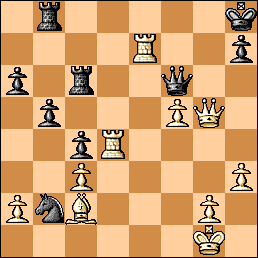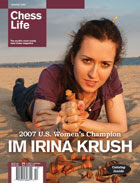I'm playing Black in the diagram, and to make it a little more of a visualization exercise we'll give a few moves:

25. Be4 Bb3 26. Rb1 and now Black to play and win.
(Don't look in the comments before you get the answer!)
The question is, said Humpty Dumpty, which is to be master — that’s all.




"In order to be more specific about Karlsbad, take one player: Hugo Süchting (1874-1916). At Karlsbad he scored 11.5/13.5 or 'minus 2', as they say these days - a perfectly respectable score. Having played over all his games at Karlsbad I think that I can confidently state that his playing strength was not greater than Elo 2100 (BCF 187) - and that was on a good day and with a following wind. Here are a couple of examples of his play:"...
[Watson: You have to get the book to see these examples of Süchting's horrendous mistakes and misunderstandings. Nunn also has talks about more positions, and then includes a section of 30 Karlsbad "puzzles", representing all of the players. The positional mistakes by the top players are particularly telling.]
"How, then, did Süchting manage to score 11.5 points in such company? Well, he did have a couple of slices of luck - Duz- Khotimirsky overstepped the time limit while two pawns up in a completely winning rook ending and Alapin agreed a draw in a position where he could win a piece straight away. However, there were some games where Süchting might have hoped for more; he certainly had Levenfish on the ropes (see puzzle 184), and he agreed a draw in the following position against E. Cohn:" [Diagram follows] "It is hard to understand this decision, as with a clear extra pawn Black certainly has very good winning chances and could proceed without the slightest element of risk."...
"Returning then to the question as to how Süchting scored 11.5 points, the answer is simply that the other players were not much better. If we assume Süchting as 2100, then his score implies an average rating for the tournament of 2129 - it would not even be assigned a category today. Based on the above, readers will not be surprised when I say that my general impression of the play at Karlsbad was quite poor, but the main flaws did not show up in the areas I expected..."
And here is my comment over at Chess Improvement: